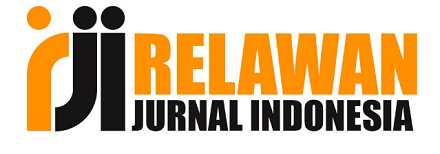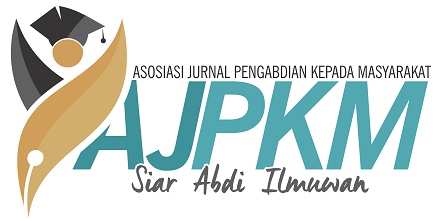Pemanfaatan dan Penanaman Tanaman Obat Keluarga (TOGA) Menuju Keluarga Sehat Pada Ibu Pemberdayaan Kesejahteraan Keluarga (PKK)
DOI:
https://doi.org/10.33474/jipemas.v3i2.6416Keywords:
TOGA, counseling, land useAbstract
The current development of the plants that have medicinal properties have progressed whereby drug discovery as well as a sophisticated new technology into alternative solutions in the pharmaceutical world progress. Utilization of the yard are generally not utilized properly has many benefits especially in terms of increasing the family income, for example as the granary of life and living pharmacy, so it needs to be developed intensively. Simple technology that can be implemented that should bring some broad benefits to society not only in the process of self-sufficiency, but also can be directed toward health independence through several development Family Medicinal Plants (TOGA). TOGA synonymous with herbal raw materials for herbal medicine which are domination with a bitter taste, has no aesthetic value and is rarely consumed by the public. This causes difficulty in the development of the value of medicinal plants. to know and understand the background of the community in understanding the background of TOGA, how to grow TOGA plants, and their use to revitalize the TOGA program, especially in Sidorejo Village. This service activities subsequently conducted outreach activities about the benefits of medicinal plants, how crops TOGA is good and right as well as the provision of some medicinal plants will be planted in the yard of the village TOGA post. Of community service activities, it is concluded that the lack of knowledge of the public in knowing the types of plants TOGA and the efficacy of various plants TOGA limited and the lack of land use that are owned by citizens.References
Andriati, & Wahjudi, R. M. T. (2016). Tingkat penerimaan penggunaan jamu sebagai alternatif penggunaan obat modern pada masyarakat ekonomi rendah-menengah dan atas. Masyarakat, Kebudayaan Dan Politik, 29(3), 133–145. https://doi.org/10.20473/mkp.v29i32016.133-145
Emilda, Hidayah, M., & Heriyati. (2017). Analisis Pengetahuan Masyarakat Tentang Pemanfaatan Tanaman Obat Keluarga (Studi Kasus Kelurahan Situgede, Kecamatan Bogor Barat). Sainmatika: Jurnal Ilmiah Matematika Dan Ilmu Pengetahuan Alam, 14(1), 11–21. https://doi.org/10.31851/sainmatika.v14i1.1106
Erlindawati. (2015). Survei Pengetahuan Masayarakat Tentang Tanaman Obat Keluarga Puskesmas Air Tabit. Jurnal Photon, 6(1), 115–118. https://doi.org/10.37859/jp.v6i01.490
Fitriatien, S. R., Rachmawati, N. E. J., Rahmah, N., Safitri, D. A., Pahlevi, M. R., & Natsir, N. M. W. (2017). Kegiatan Penanaman Tanaman Obat Keluarga (Toga) Sebagai Salah Satu Usaha Pemberdayaan Siswa Sdn Dermo Guna Dalam Menumbuhkan Kepedulian Kesehatan Keluarga. Abadimas Adi Buana, 1(2), 21–28. https://doi.org/10.36456/abadimas.v1.i2.a949
Kusumawaty, Y., & Khaswarina, S. (2018). Peningkatan Motivasi Ibu Rumah Tangga Untuk Memanfaatkan Tanaman Obat Keluarga (Toga). Buletin Udayana Mengabdi, 17(1), 7–13. https://doi.org/10.24843/bum.2018.v17.i01.p02
Martino, Y. A., Sulistiowati, E., & Purnomo, Y. (2018). Model Pemberdayaan Santri Ponpes Al-Hidayah Batu Alang Sebagai Kader Kesehatan Berbasis Terapi Herbal. Jurnal Inovasi Hasil Pengabdian Masyarakat (JIPEMAS), 1(2), 86–93. https://doi.org/10.33474/jipemas.v1i2.1514
Moleong, L. J. (2017). Metodologi Penelitian Kualitatif (Edisi Revisi). PT. Remaja Rosdakarya.
Muttaqin, F. Z., Aligita, W., Muhsinin, S., Juanda, D., & Asnawi, A. (2018). Desa Mitra dalam Budidaya Tanaman Obat Keluarga Menuju Desa Cibiru Wetan sebagai Sentra Herbal. Jurnal Pengabdian Pada Masyarakat, 3(2), 159–164. https://doi.org/10.30653/002.201832.59
Pratiwi, R., Saputri, F. A., & Nuwarda, R. F. (2018). Tingkat Pengetahuan Dan Penggunaan Obat Tradisional Di Masyarakat: Studi Pendahuluan Pada Masyarakat Di Desa Hegarmanah, Jatinangor, Sumedang. Dharmakarya: Jurnal Aplikasi Ipteks Untuk Masyarakat, 7(2), 97–100. https://doi.org/10.24198/dharmakarya.v7i2.19295
Sari, I. D., Yuniar, Y., Siahaan, S., Riswati, & Syaripuddin, M. (2015). Tradisi Masyarakat dalam Penanaman dan Pemanfaatan Tumbuhan Obat Lekat di Pekarangan. Jurnal Kefarmasian Indonesia, 5(2), 123–132. https://doi.org/10.22435/jki.v5i2.4407.123-132
Satriyati, E. (2016). Pola Tradisi Minum Jamu: Upaya Pemertahanan Pengobatan Lokal Sebagai Identitas Masyarakat Bangkalan Madura. Dimensi, 9(2), 115–122. https://journal.trunojoyo.ac.id/dimensi/article/view/3749
Supardi, S., & Herman, M. J. (2010). YANG MEMILIH PENGOBATAN RUMAH TANGGA DI INDONESIA ( Analisis Data Riskesdas 2007 ). Buletin Penelitian Sistem Kesehatan, 13(2), 163–168. http://ejournal.litbang.kemkes.go.id/index.php/hsr/article/view/2235
Supardi, S., Herman, M. J., & Yuniar, Y. (2011). Penggunaan Jamu Buatan Sendiri Di Indonesia (Analisis Data Riset Kesehatan Dasar Tahun 2010). Buletin Penelitian Sistem Kesehatan, 14(4), 375–381. https://doi.org/10.22435/bpsk.v14i4Okt.1382
Supriani, A. (2019). Peranan Minuman Dari Ekstrak Jahecang Untuk Meningkatkan Kesehatan Masyarakat. Jurnal SainHealth, 3(1), 30–39. https://e-journal.umaha.ac.id/index.php/sainhealth/article/view/370
Viena, V., Yunita, I., Irhamni, Saudah, & Ernilasari. (2018). Biodiversitas Tumbuhan Obat oleh Masyarakat Gampong Pulo Seunong Kecamatan Tangse Kabupaten Pidie. Elkawnie, 4(1), 89–100. https://doi.org/10.22373/ekw.v4i1.3027
Downloads
Published
How to Cite
Issue
Section
License
.









